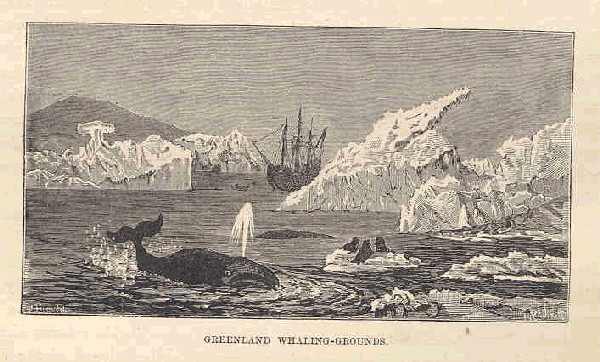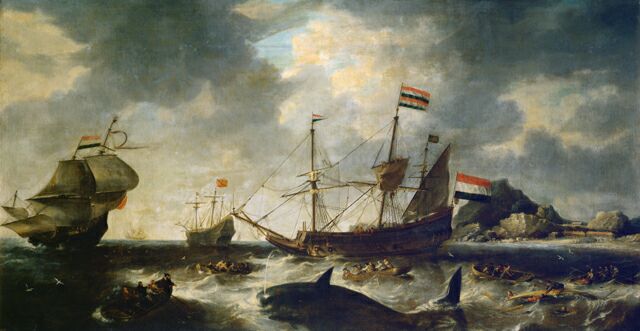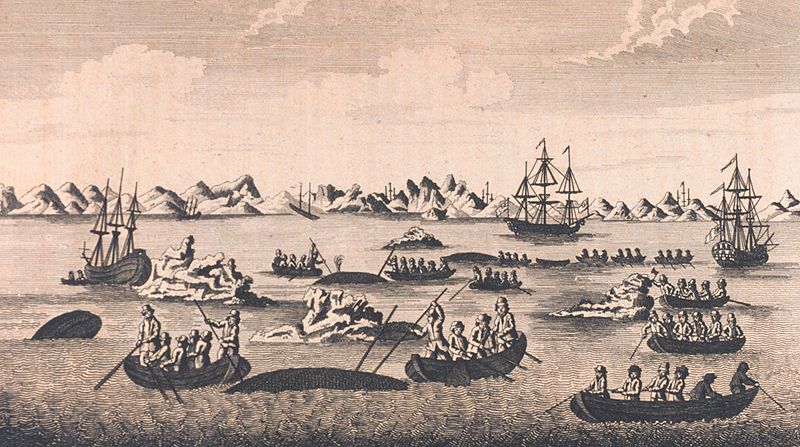Difference between revisions of "Whaling in London"
From Londonhua WIKI
Mthatfalvi (talk | contribs) |
Mthatfalvi (talk | contribs) |
||
| Line 27: | Line 27: | ||
<br> | <br> | ||
==Beginning of Whaling== | ==Beginning of Whaling== | ||
| − | |||
According to the London Waling Trade article on the London Port Cities website, the Middle Ages saw the start of the hunting of whales in the Bay of Biscay by Basque fishermen. <ref name = "wal">The London whaling trade. (n.d.). Retrieved May 23, 2017, from http://www.portcities.org.uk/london/server/show/ConNarrative.129/chapterId/2633/The-London-whaling-trade.html </ref> Then in the 17th century, English and Dutch whalers working for the Muscovy Company started searching in the Arctic for whales to trade with Russia. | According to the London Waling Trade article on the London Port Cities website, the Middle Ages saw the start of the hunting of whales in the Bay of Biscay by Basque fishermen. <ref name = "wal">The London whaling trade. (n.d.). Retrieved May 23, 2017, from http://www.portcities.org.uk/london/server/show/ConNarrative.129/chapterId/2633/The-London-whaling-trade.html </ref> Then in the 17th century, English and Dutch whalers working for the Muscovy Company started searching in the Arctic for whales to trade with Russia. | ||
<br><br> | <br><br> | ||
===Greenland Whaling=== | ===Greenland Whaling=== | ||
The Greenland Company took over the whaling side of the Muscovy Company because it was granted monopoly rights given by the government. London then had 20 whaling ships in the 1620s. During this whaling time though the English had bitter competition with the Dutch who eventually dominant them by mid 17th century. | The Greenland Company took over the whaling side of the Muscovy Company because it was granted monopoly rights given by the government. London then had 20 whaling ships in the 1620s. During this whaling time though the English had bitter competition with the Dutch who eventually dominant them by mid 17th century. | ||
| + | <gallery | ||
| + | [[File:Walfang zwischen 1856 und 1907.jpg|300px|thumb|A New England whaler]][[File:Dutch Whaling Scene Bonaventura Peeters.JPG|thumb|right|300px|Dutch Whaling Scene by Bonaventura Peeters (1645)]] | ||
[[File:Cook-whaling.jpg|300px|right|thumb|A view of whale fishery (1790)]] | [[File:Cook-whaling.jpg|300px|right|thumb|A view of whale fishery (1790)]] | ||
<br><br> | <br><br> | ||
Revision as of 18:10, 21 June 2017
Whaling in London
 Greenland Whaling | |
| Greenland Whaling | |
|---|---|
| Artist | Attributed to Frederick Whymper |
| Year | 1883 |
Overview
Whaling is a practice from back in the middle ages. In the 17th century, English whalers from the Greenland company started whaling. Overall, the whaling trade has periods of grown and decline. In the time of 1750, whale oil was used as regular oil is used today for lubricating machinery and other stuff. The whaling trade in London since the 1960's has closed due to other better sources of oil.
Contents
Background
Beginning of Whaling
According to the London Waling Trade article on the London Port Cities website, the Middle Ages saw the start of the hunting of whales in the Bay of Biscay by Basque fishermen. [1] Then in the 17th century, English and Dutch whalers working for the Muscovy Company started searching in the Arctic for whales to trade with Russia.
Greenland Whaling
The Greenland Company took over the whaling side of the Muscovy Company because it was granted monopoly rights given by the government. London then had 20 whaling ships in the 1620s. During this whaling time though the English had bitter competition with the Dutch who eventually dominant them by mid 17th century. <gallery
Death of Whaling
In 1750, whale oil was being used for street lighting, machine lubricating in paint and putty. [1] Then the oil was replaced by gas and alternative oil sources. This brought the end to the big whaling industry in London and the last whale ship was sent out in 1835.
References
- ↑ 1.0 1.1 The London whaling trade. (n.d.). Retrieved May 23, 2017, from http://www.portcities.org.uk/london/server/show/ConNarrative.129/chapterId/2633/The-London-whaling-trade.html


